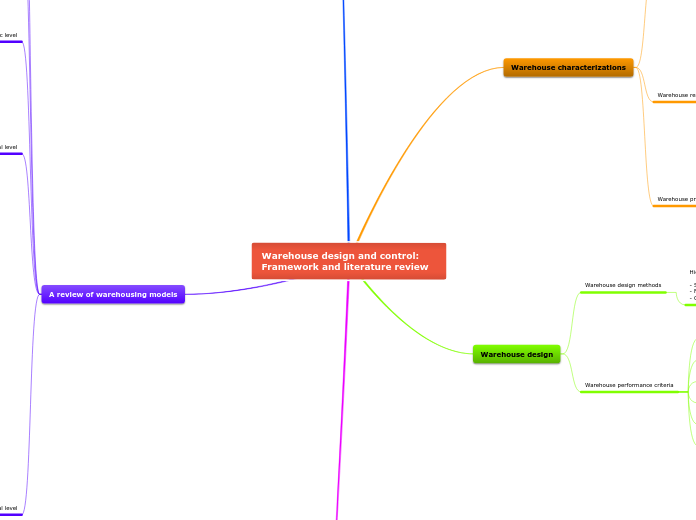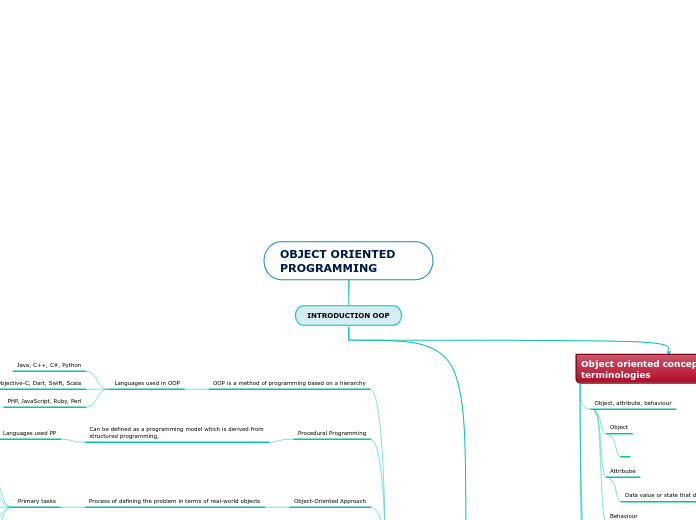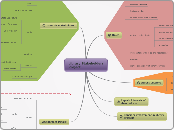Warehouse design and control: Framework and literature review
Warehouse design problems
Operational level
Short-term decisions
Assignment and control of personnel and equipment problems.
Tactical level
Medium-term decisions
Dimensions of resources
Number of employees
System sizes
Storage
Strategic level
Long-term decisions
Selection of types of storage systems
Process design
A review of warehousing models
Warehouse design problems: Operational level
Overview
the overall picture that emerges seems to
suggest that current research, although useful in itself
most papers seem to focus on isolated
warehouse organizational policies
Miscellaneous
Van den Berg analyzes a number of
operational control problems
Sarker and Babu review the literature
concerning the operational control of AS/RS's
Storing and sequencing
Schwartz use simulation to approximate the
maximum throughput of an AS/RS
Van Oudheusden analyze this problem
for a person-on-board AS/RS
Graves evaluate the impact of sequencing
and class-based storage policies on
warehouse performance
Dwell point selection
Peters present an analysis to approximate the response time for multiple AS/RS configurations and dwell point policies.
Egbelu and Wu evaluate several dwell point
policies
Egbelu presents an algorithm for the dwell
point selection
Routing and sequencing
Ratli and Rosenthal present an algorithm for the routing
Hall and De Koster and Van der Poort determine
analytical expressions to evaluate the routing
Gelders and Heeremans analyze routing in a
conventional warehouse
Storage policies
SubJarvis and McDowell propose a heuristic for
the storage policy in a conventional warehousetopic
Marsh has been working on the same problem
but evaluates two alternative policies.
Goetschalckx and Ratli evaluate storage policies for block storage through an analytical study.
Batching
Rosenwein analyzes the maximum throughput in a conventional warehouse
Elsayed and Unal derive analytical expressions to evaluate
batching algorithms
Elsayed and Stern test 24 batching algorithms with the aid of simulation
Warehouse design problems: Tactical level
In conclusion, many papers at the tactical level
concern the performance of, mostly automated,
warehousing systems.
Karasawa and Ashayeri analyze
the AS/RS
Bozer and White consider end-of-aisle
orderpicking systems.
Marnix and Sharp evaluate the performance of several con®gurations of a carousel system
Warehouse design problems: Strategic level
Most publications analyze the performance of a
warehouse in order to be able to compare the
system with alternative ones.
Oser provides an analysis of an automated transfer
car storage
A limited number of publications deal
with problems in the second cluster.
Rink and Waibel describe Lasys, a German decision support system for warehouse design
Frazelle and Hackman provide an empirical study concerning the evaluation of warehouses
Yoon and Sharp suggest an elaborate conceptual procedure for the design of an orderpick system
Duve and Bocker propose a step-wise design
method
Ashayeri and Goetschalckx provide a step-wise general design procedure
Warehouse literature overviews
important gaps in the research fieelds existed
most research seemed to concentrate on rather
limited problems
Design oriented research
design oriented research
policies cannot be isolated
can at best be partial
are difficult to quantify
can be combined in multiple ways
is often complex
analysis oriented research
the effects can be quantified
can be quantified
easily modelled
alternatives is fully known
Warehouse design
Warehouse performance criteria
Order fulfillment quality
Response time
Storage capacity
Performance
Mixing volume and flexibility
Investment and operating costs
Warehouse design methods
Hierarchical level:
- Strategic
- Functional
- Operational.
Recognize the relationships between problems, to avoid suboptimal solutions
Solutions chosen at a higher level provide the limitations for lower-level design problems.
Warehouse characterizations
Warehouse processes
Shipping area
Orderpicking
The storage process
The receiving process
Warehouse resources
Material handling equipment for preparation
Computer system
Retrieval of items
Storage system
Storage unit
Warehouse organization
Allocation of tasks to personnel and
equipment are addressed by operator
Shipping process - orders and trucks are
assigned to the docks
Order preparation process - Selection areas
Storage process - particular location for each product
Reception process - Assignment of trucks to the docks
Process flow at the design stage









